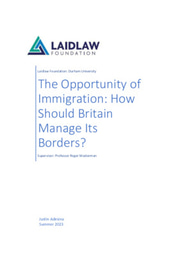Reflecting on my LiA: Educating Musanze, Kinigi, and Kigali
The past month has been a truly unique experience. Following my critiques of the so-called “Rwanda Plan” proposed by the last Tory government, I felt that the natural continuation of my Laidlaw experience would be to spend my summer experiencing all Rwanda has to offer.
The majority of my time in Rwanda has been spent in the northern province of Musanze, a place known for its wildlife and volcanoes. I worked with Partners for Conservation, an NGO that works to combine tourism and volunteering to better local communities. Initially I planned to handle their administrative work, however I decided to push myself out of my comfort zone and accepted a role as an English teacher.
I spent my weeks teaching pupils of all ages in Kinigi. My students hailed from nearby villages, situated under a mountainous region. Tourism is a key aspect of their village life, with many students using the English lessons to further their abilities as tour guides. I had the privilege of visiting some of these villages and whilst they were to some degree self sustaining, the villagers also made it clear that they had been neglected by their government.
Teaching in Kinigi proved to be an invaluable experience and, spending my last week in Kigali, I decided to continue this work by volunteering with the Kwizera Charity Foundation. Run by a friend of my mother’s, the Kwizera Foundation focusses on the scholastic and emotional development of young children, providing extra classes as well as counselling. Once again I was part of an opportunity that would change many of the lives of local children. My days as a teacher taught me lots about leadership, as I had to build a relationship of mutual respect despite the language barrier.
Unfortunately I encountered a pretty harrowing example of poor leadership that disturbed me deeply. I was meant to spend a week as a teaching assistant in a local school however within 20 minutes I decided the culture of the school was not one that I felt comfortable contributing to. Rwanda still allows physical punishment in schools. Watching a teacher slap children for making mistakes made me genuinely quite sick to my stomach. So I refused to work with him and instead continued my independent lessons in Kinigi. Though the experience of the school was dreadful, it taught me the importance of mutual respect. I saw firsthand how using fear to lead only stifled creativity and the children’s learning process. I intend to write to the school and express this. Children are not dogs to be trained but minds to be cultivated.
Generally, my time in Rwanda has added another dimension to my understanding of the Rwanda Plan. The majority of discourse surrounding it concerned itself with Britain’s relationship with its borders. Seldom did we consider the impact it would have had on Rwanda itself. I am firmly of the belief that the best thing for Rwanda is an investment in education and community empowerment. I believe that the Rwanda Plan would put excess pressure on infrastructure and create an administrative nightmare. Britain has the infrastructure to handle high levels of immigration, but in my opinion Rwanda must prioritise the future of its children above anything at this point in time, creating opportunities for growth that in future will allow them to support a higher level of immigration.
Overall, my time spent in Rwanda has flown by but the experience itself will stick with me forever. I’m forever grateful to the Laidlaw Foundation for giving me this opportunity, as well as the two charities that took me in and made my time unforgettable. Rwanda is a country going through a period of change, and as it seeks to improve infrastructure and education, I’m certain we will see more of them on the global stage.


Please sign in
If you are a registered user on Laidlaw Scholars Network, please sign in